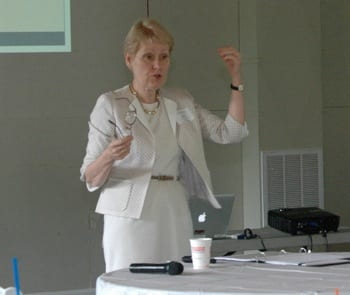Who is a member?
Our members are the local governments of Massachusetts and their elected and appointed leadership.
 Municipalities should develop policies to guide the use of social media by employees, both professionally and personally, according to attorney Elizabeth Valerio of Deutsch Williams, who addressed the topic at the June 16 meeting of the Massachusetts Municipal Personnel Association in Wareham.
Municipalities should develop policies to guide the use of social media by employees, both professionally and personally, according to attorney Elizabeth Valerio of Deutsch Williams, who addressed the topic at the June 16 meeting of the Massachusetts Municipal Personnel Association in Wareham.
Valerio provided an insightful and thorough presentation on social media’s role for cities and towns, using real-life examples of putting policy into practice. She said policies should be clear and concise and posted on the city or town website. Official social media feeds should be linked to and from the municipal website as well, to help make it clear which accounts are official.
Municipalities should designate employees to create official social media accounts and to use those accounts, Valerio said. Employees should receive training on the appropriate use and moderation of the accounts, including an understanding of the applicability of the public records law. Policies should be explicit in how the accounts should be used, so there is no confusion on either side.
For each social media platform, municipalities must decide whether to permit public comment, which could constitute open public forums and be protected under the First Amendment. Municipalities can choose to disable commenting so that communication is one-way to the public. Alternatively, municipalities can clearly designate their pages to be a “limited/designated public forum,” limiting the page to a specific subject matter and reserving the right to remove comments that are off topic or considered obscene, harassing or discriminatory. Enforcement of any such policy, however, must be uniform and fair in order to avoid violating the First Amendment.
Valerio discussed several examples municipalities have faced regarding personal social media use by municipal employees. She said employers should develop a separate policy governing personal use of social media, but should be careful not to go overboard. Policies should address what can and cannot be shared regarding city/town/employer information, what would constitute a violation, and what would be the consequences. Social networking is speech, she said, so municipalities will always need to consider First Amendment rights.
When there is an incident due to a personal posting, the municipality will need to determine if discipline is appropriate. To do so, municipalities should ask two questions: Is the speech a matter of public concern, and was the speech made as a private citizen? Employers may also need to determine if the communication falls under protected concerted activity.
Attendees had a number of questions regarding the implications of open meeting law, public records law and when disciplinary action would be appropriate. When faced with a social media concern, municipalities should consult legal counsel and any applicable policies in place, while considering First Amendment rights and protected concerted activity. Employers should caution employees that all online communication has the potential to become public and affect the workplace, whether the use is professional or personal.